This was an article that I wrote for our local paper, the York Daily Record, who was kind enough to run it as an op-ed piece on Sunday. It’s on their YDR webpage, too. I’ve added more books below then the few I had in the article in the paper and described them a bit. I thought you might want to see it, and see the books listed. They are on sale and you can use our secure order form page by clicking the link below.
Early morning, April four
Shots ring out in the Memphis sky
Free at last, they took your life
They could not take your pride
A whole generation of millennials learned the date of Martin Luther King’s assassination not from their history books but from the most important rock band of their era, U2, and their powerful song Pride (In the Name of Love.) Those of us who remember that awful date because we followed Dr. King in the harsh days of 1968 were reminded of what happened at the Lorraine Motel by Bono and I, for one, am grateful.
Those shots rang out 50 years ago last Wednesday.
Even those churches with a vision of civil rights and social justice – which is to say Roman Catholics, most mainline denominational Protestant congregations and increasingly, some evangelicals — don’t teach much about King or his vision, let alone his death. My sense is that many historically Black and Latino churches do not much, either.
Which is odd, since Dr. King was one of the most overtly Christian public intellectuals of our time and one of the most eloquent preachers in American history. He remains a lively interpreter of Christ’s call to make a difference in the world. The shallow intellect and lax moral qualities of today’s celebrity preachers, from Jerry Falwell to Franklin Graham to Joel Olsteen, put into high relief the caliber of the likes of King and his colleagues in the civil rights movement.
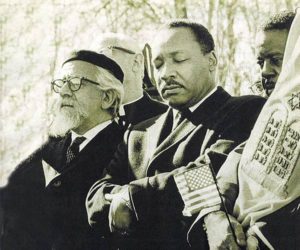 Granted, King himself had his own besetting sins and foibles. (The scene in the must-see film Selma when King calls gospel singer Mahalia Jackson late at night to sing to him his favorite hymn because he was so scared is based on a true incident.) He and his associates, like all of us, had feet of clay. Yet, America hasn’t in years seen the likes of public theologians such as those that marched with King – just think of the Jewish leader Abraham Heschel, black Baptist preacher and King’s Lieutenant Ralph Abernathy, or the Presbyterian William Sloane Coffin, converted to public justice issues after a stint in the CIA. These were leaders that were well read, deeply conversant in the best American political theory, and profoundly committed to thoughtful engagement with Scripture.
Granted, King himself had his own besetting sins and foibles. (The scene in the must-see film Selma when King calls gospel singer Mahalia Jackson late at night to sing to him his favorite hymn because he was so scared is based on a true incident.) He and his associates, like all of us, had feet of clay. Yet, America hasn’t in years seen the likes of public theologians such as those that marched with King – just think of the Jewish leader Abraham Heschel, black Baptist preacher and King’s Lieutenant Ralph Abernathy, or the Presbyterian William Sloane Coffin, converted to public justice issues after a stint in the CIA. These were leaders that were well read, deeply conversant in the best American political theory, and profoundly committed to thoughtful engagement with Scripture.
As we commemorate the 50th anniversary of the death of Martin Luther King many have said nice things about him; radio shows played clips from the “I Had a Dream Speech” and even those who care little about his teachings – Christian nonviolence, a radical critique of empire and materialism, the dignity of all people, including the prisoner and the poor – will clamber to pay homage.
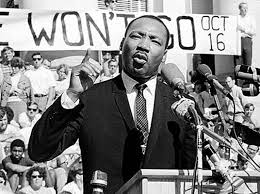 I want to cry out when I hear ministers (of any race) and public officials (of any party) quoting King as if they know something about him or care about his social agenda when it is evident they do not. (Mike Huckabee scolded Black Lives Matters activists saying King wouldn’t have approved when that was not self-evident. How dare he suggest he cares what King thought when in so many ways he obviously does not?) I sometimes wonder how many people who cite him have read even a single of his many books?
I want to cry out when I hear ministers (of any race) and public officials (of any party) quoting King as if they know something about him or care about his social agenda when it is evident they do not. (Mike Huckabee scolded Black Lives Matters activists saying King wouldn’t have approved when that was not self-evident. How dare he suggest he cares what King thought when in so many ways he obviously does not?) I sometimes wonder how many people who cite him have read even a single of his many books?
Do we recall what the great preacher was doing in Memphis that fateful April day? He was taking his stand with underpaid garbage workers, helping their union fight for fair wages against a system stacked against the poor of all colors. He was exhausted, working harder than ever, not just for desegregation – the movement was making headway on the racial integration of lunch counters, schools, and voting rights – but against poverty, against corporate malfeasance and crony capitalism that oppressed those in the third world and kept folks poor here at home. One of his most fiery speeches was preached at a church in New York exactly one year earlier in which he passionately and unequivocally condemned the Vietnam war. It was so blistering even the New York Times criticized it.
As Jason Sokol, author of the new The Heavens Might Crack: The Death and Legacy of Martin Luther King, Jr. writes, in a concluding chapter “From Outlaw to Saint”,
Americans were able to admire King because they picked and chose which parts of his career they wanted to embrace. They scrubbed his message and blunted his meaning. Eventually, the historical King – a courageous dissident who unsettled the powerful –would be replaced by a mythical one. Many white Americans concentrated on that single line from King’s “I Have a Dream” speech and effectively reduced his life to one quotation. They began to appropriate King’s legacy and wield it in their own causes.
In his last years Rev. King increasingly tempered the optimism of “The Dream” insisting that for many it had become a nightmare. Yet, he continued to share his own faith in the gospel. Many have heard his tired but reassuring words on the evening of April 3rd about not being afraid of dying since he knew he’d go to heaven; he was a preacher, after all, and his agenda for social righteousness was motivated by deep, personal faith.
But he also pressed harder than ever to – as the Biblical prophet Amos put it – “let justice roll down” and to (as the prophet Isaiah put it) “break every yoke and let the oppressed go free.” He understood what Jesus meant when he said that the “weightier matters of the law” are justice and mercy. Perhaps because Martin was so rooted in the prophetic ethics of Biblical faith, it isn’t surprising that black Christian philosopher Cornel West has called him “The Radical King.”
We must reject the milk-toast view of King the noble reformer, safe and domesticated. We should familiarize ourselves with his profound theological tradition of Biblical reflection on themes of public justice and liberation. We should ponder his vision of being a global citizen, caring about the hungry abroad and rising up to be assertive peacemakers in a world of warriors. We should honor his commitments to reform the social architecture of society and the values that undergird it, which, of course, demands some willingness to bring prophetic critique to the status quo and the driving forces of the culture. Inspired by the Reverend King we should be glad for those who stand against police brutality, who work for better health care policy, who are welcoming of immigrants and refugees, who demand firm legislation that upholds the cause of the hurting. Like Dr. King, and the Hebrew prophet Isaiah he so loved, we must cry out to legislators saying “Woe to them that decree unrighteous decrees…who turn aside the poor.”
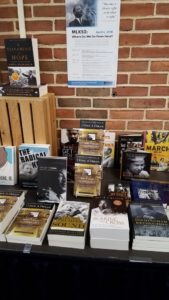 A good place to determine if we want to align ourselves with Dr. King’s vision is to read books by and about him.
A good place to determine if we want to align ourselves with Dr. King’s vision is to read books by and about him.
At our Dallastown bookstore we once got an alarming, near-death threat shoved under our door for featuring books by the great preacher. But we shall not be moved. We will continue to promote books about King’s philosophy of nonviolence and will continue to resource those who want to work for social change, connecting human flourishing and the common good to the great American experiment that King spoke about so eloquently
Here are several for starters. All on sale.
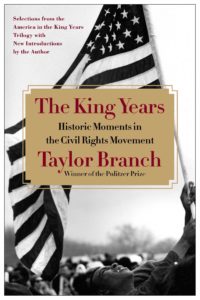 The King Years: Historic Moments in the Civil Rights Movement Taylor Branch (Simon & Schuster) $16.00 Taylor Branch is widely respected for his massive, magisterial three-volume history of “American in the King Years.” This one is a smaller, vivid, accessible summary of the bigger set and offers helpful background and texture to King’s work. The best way to learn the most important episodes of the civil rights movement; highly recommended even though they are not all about Dr. King.
The King Years: Historic Moments in the Civil Rights Movement Taylor Branch (Simon & Schuster) $16.00 Taylor Branch is widely respected for his massive, magisterial three-volume history of “American in the King Years.” This one is a smaller, vivid, accessible summary of the bigger set and offers helpful background and texture to King’s work. The best way to learn the most important episodes of the civil rights movement; highly recommended even though they are not all about Dr. King.
 March Book One, March Book Two, March Book Three John Lewis, Andrew Aydin and Mate Powell (Top Shelf Productions) $14.95, $19.95, $19.95 I hope you know these excellently done, slightly oversized graphic novels that tell the biography of this grand civil rights leader who worked closely with King. Congressman Lewis, as you may know, is the only living main stage speaker from the famous March on Washington and, of course, was a leader at Selma and beyond. While not only about King, it is a great way into these stories and that era, especially for those who appreciate comic books and graphic novels.
March Book One, March Book Two, March Book Three John Lewis, Andrew Aydin and Mate Powell (Top Shelf Productions) $14.95, $19.95, $19.95 I hope you know these excellently done, slightly oversized graphic novels that tell the biography of this grand civil rights leader who worked closely with King. Congressman Lewis, as you may know, is the only living main stage speaker from the famous March on Washington and, of course, was a leader at Selma and beyond. While not only about King, it is a great way into these stories and that era, especially for those who appreciate comic books and graphic novels.
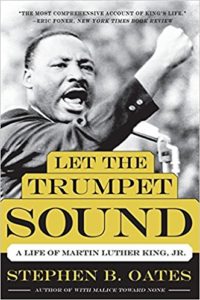
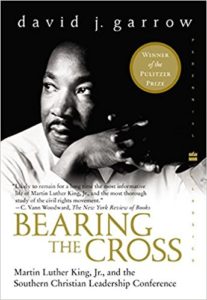
Let the Trumpet Sound: A Life of Martin Luther King, Jr. Stephen Oates (Harper) $19.99 This has won numerous awards is still widely considered one of the very best biographies of King.
Bearing the Cross: Martin Luther King, Jr. and the Southern Christian Leadership Conference David Garrow (William Morrow) $22.99 The respected historian won the Pulitzer Prize for this beautiful, painstaking study of King’s SCLC years. We should all know about the Southern Christian Leadership Conference and this book tells it brilliantly.
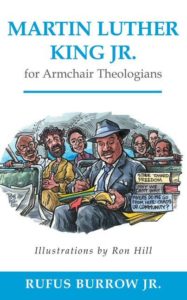 Martin Luther King Jr. for Armchair Theologians Rufus Burrow (Westminster John Knox) $18.00 I hope you know these “Armchair Theologians” books — they really are very interesting, complete with a few helpful cartoons. They aren’t really whimsical, but they are designed to study serious stuff about various theologians and their intellectual influences. There are bunches of them (on Luther, Bonhoeffer, Augustine, Calvin, Wesley, Aquinas, and more.) This one is solid, interesting, helpful, fun. You will learn a lot, I’m sure.
Martin Luther King Jr. for Armchair Theologians Rufus Burrow (Westminster John Knox) $18.00 I hope you know these “Armchair Theologians” books — they really are very interesting, complete with a few helpful cartoons. They aren’t really whimsical, but they are designed to study serious stuff about various theologians and their intellectual influences. There are bunches of them (on Luther, Bonhoeffer, Augustine, Calvin, Wesley, Aquinas, and more.) This one is solid, interesting, helpful, fun. You will learn a lot, I’m sure.
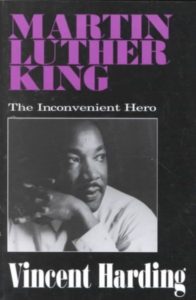 Martin Luther King: The Inconvenient Hero Vincent Harding (Orbis) $16.00 I have long admired the colorful Harding, a storyteller of the first order, a passionate and decent leader of the movement. (His There Is a River is another classic in the literature of the black struggle for freedom in America.) He knows the stories, he knows why we must keep telling them, and he offers here a hard reminder of what King stood for.
Martin Luther King: The Inconvenient Hero Vincent Harding (Orbis) $16.00 I have long admired the colorful Harding, a storyteller of the first order, a passionate and decent leader of the movement. (His There Is a River is another classic in the literature of the black struggle for freedom in America.) He knows the stories, he knows why we must keep telling them, and he offers here a hard reminder of what King stood for.
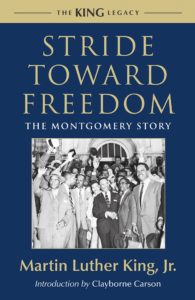
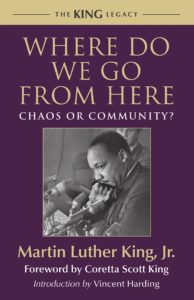
Stride Toward Freedom: The Montgomery Story Martin Luther King, Jr. (Beacon Press) $16.00 This was King’s first book and wonderfully documents the drama of the famous bus boycott that catapulted him to the national spotlight. I often say this is one of my own personal favorite books and it shows not only King coming to terms with Biblical nonviolence (his seminary professors tried to talk him out of it) and how the famous bus boycott got organized.
Where Do We Go From here: Chaos or Community? Martin Luther King, Jr. (Beacon Press) $16.00 This handsome companion volume to Stride Toward Freedom is the last book Dr. King wrote. This edition has the famous foreword by Coretta and a recent introduction by the great Vincent Harding. Powerful stuff.
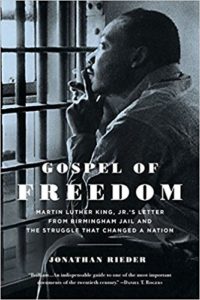 Gospel of Freedom: Martin Luther King Jr.’s Letter from a Birmingham Jail and the Struggle That Changed a Nation Jonathan Rieder (Bloomsbury) $16.00 King’s short letter written from a jail cell to moderate, sympathetic clergy, remains one of the classics of American literature; the rhetoric and eloquence of it is nothing short of brilliant. Professor Rieder explores the setting and the implications of this period of King’s life. It is widely considered a major contribution and was highly reviewed when it came out a few years ago.
Gospel of Freedom: Martin Luther King Jr.’s Letter from a Birmingham Jail and the Struggle That Changed a Nation Jonathan Rieder (Bloomsbury) $16.00 King’s short letter written from a jail cell to moderate, sympathetic clergy, remains one of the classics of American literature; the rhetoric and eloquence of it is nothing short of brilliant. Professor Rieder explores the setting and the implications of this period of King’s life. It is widely considered a major contribution and was highly reviewed when it came out a few years ago.
Birmingham Revolution: Martin Luther King Jr.’s Epic Challenge to the Church Edward Gilbreath (IVP) $16.00 Gilbreath is an exceptionally thoughtful and well informed black evangelical; his 2008 book Reconciliation Blues is an honest study of white Christianity. I think this is an excellent bit of research, one which Curtiss Paul DeYoung calls “magnificent.” One reviewer wrote:
“In this book African American journalist Edward Gilbreath explores the place of that letter in the life and work of Dr. King. Birmingham Revolution is not simply a work of historical reflection. Gilbreath encourages us to reflect on the relevance of King’s work for the church and culture of our day. Whether its in debates about immigration, economic redistribution or presidential birth certificates, race continues to play a role in shaping society. What part will the church play in the ongoing struggle?”
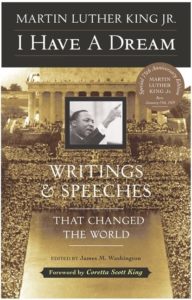 I Have A Dream: Sermons and Writings That Changed the World Martin Luther King, Jr. (Harper) $15.99 There are bigger anthologies (such as the large A Testament of Hope) but this is the best, most economical one-volume collection of his most important writings.
I Have A Dream: Sermons and Writings That Changed the World Martin Luther King, Jr. (Harper) $15.99 There are bigger anthologies (such as the large A Testament of Hope) but this is the best, most economical one-volume collection of his most important writings.
Editor James M. Washington arranged the selections chronologically, providing headnotes for each selection that give a running history of the civil rights movement and related events. In his introduction, Washington assesses King’s times and significance. A must.
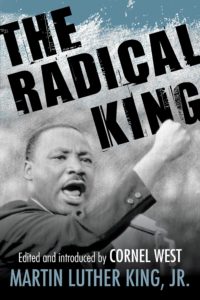 The Radical King edited by Cornel West (Beacon Press) $16.00 The contemporary philosopher, activist, and public intellectual selects and introduces various letters, speeches, and essays of King’s that best illustrate his radical social vision. I hope you know West and his several books (including a recently re-issued Race Matters.) He has done us a great service to offer this particularly curated selection and a few explanatory notes about each reading. We have good studies of “the domestication” of King; this one allows you to read his words for yourself.
The Radical King edited by Cornel West (Beacon Press) $16.00 The contemporary philosopher, activist, and public intellectual selects and introduces various letters, speeches, and essays of King’s that best illustrate his radical social vision. I hope you know West and his several books (including a recently re-issued Race Matters.) He has done us a great service to offer this particularly curated selection and a few explanatory notes about each reading. We have good studies of “the domestication” of King; this one allows you to read his words for yourself.
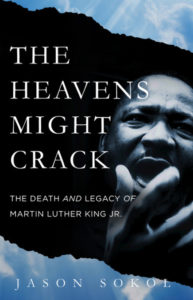 The Heavens Might Crack: The Death and Legacy of Martin Luther King, Jr. Jason Sokol (Basic Books) $32.00 This new hardback is great social history, reminding us well what King was up to his last year, what happened in the immediate aftermath of his murder (where would the funeral be held, how would they move the body, who would attend, why didn’t President Johnson show?) and how the subsequent riots effected the nation. This is a riveting read, highly recommended.
The Heavens Might Crack: The Death and Legacy of Martin Luther King, Jr. Jason Sokol (Basic Books) $32.00 This new hardback is great social history, reminding us well what King was up to his last year, what happened in the immediate aftermath of his murder (where would the funeral be held, how would they move the body, who would attend, why didn’t President Johnson show?) and how the subsequent riots effected the nation. This is a riveting read, highly recommended.
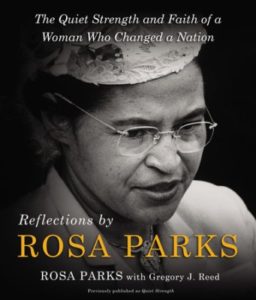 Reflections by Rosa Parks: The Quiet Strength and Faith of a Woman Who Changed a Nation Rosa Parks (Zondervan) $ This fabulous book used to be out as Quiet Strength and it is great to see it again with this excellent cover and nice, hand-sized, square, gift-book format. This is inspiring, of course, and is a fine way to learn a bit about the early days of the Montgomery Bus Boycott and also to hear about the classic faith of many of Kings friends and influences. Love it!
Reflections by Rosa Parks: The Quiet Strength and Faith of a Woman Who Changed a Nation Rosa Parks (Zondervan) $ This fabulous book used to be out as Quiet Strength and it is great to see it again with this excellent cover and nice, hand-sized, square, gift-book format. This is inspiring, of course, and is a fine way to learn a bit about the early days of the Montgomery Bus Boycott and also to hear about the classic faith of many of Kings friends and influences. Love it!
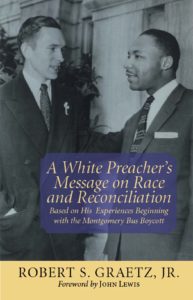 A White Preacher’s Message on Race and Reconciliation Based on His Experiences Beginning with the Montgomery Bus Boycott Rev. Robert Graetz (NewSouth Books) $26.95 Graetz was in 1955 when the Montgomery Bus Boycott began, a young white Lutheran pastor of a mostly black church. He has learned quite a lot over the years and some of our friends in the CCO have gone on civil rights tours with him. This is a rare and very special contribution, nicely done. There is a forward by John Lewis.
A White Preacher’s Message on Race and Reconciliation Based on His Experiences Beginning with the Montgomery Bus Boycott Rev. Robert Graetz (NewSouth Books) $26.95 Graetz was in 1955 when the Montgomery Bus Boycott began, a young white Lutheran pastor of a mostly black church. He has learned quite a lot over the years and some of our friends in the CCO have gone on civil rights tours with him. This is a rare and very special contribution, nicely done. There is a forward by John Lewis.
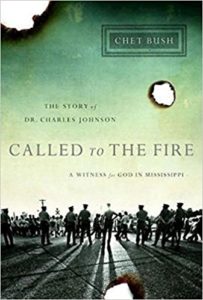 Called to the Fire: A Witness for God in Mississippi: The Story of Dr. Charles Johnson Chet Bush (Abingdon Press) $21.99 There are so many books like this, quiet, moving, informative stories that you may have never heard, lesser-known saints who served God despite all. This moving tale tells of Dr. Charles Johnson who was the key African American witness to take the stand in the trial famously dubbed the “Mississippi Burning” case by the FBI. Dr. Johnson was a young preacher fresh out of Bible College and became a voice for justice and equality in the segregated south. As the publisher says:
Called to the Fire: A Witness for God in Mississippi: The Story of Dr. Charles Johnson Chet Bush (Abingdon Press) $21.99 There are so many books like this, quiet, moving, informative stories that you may have never heard, lesser-known saints who served God despite all. This moving tale tells of Dr. Charles Johnson who was the key African American witness to take the stand in the trial famously dubbed the “Mississippi Burning” case by the FBI. Dr. Johnson was a young preacher fresh out of Bible College and became a voice for justice and equality in the segregated south. As the publisher says:
Unwittingly thrust into the heart of a national tragedy – the murder of three civil rights activists – Dr. Johnson overcame fear and adversity to become a leader in the civil rights movement. He played a vital role for the Federal Justice Department, offering clarity to the event that led to the Voting Rights Act of 1965. And, in a shocking turn of events, Johnson offered a path of reconciliation for one of the convicted killers. A story of love, conviction, adversity, and redemption, Called to the Fire is a riveting account of a life in pursuit of the call of God and the fight for justice and equality.
BookNotes

SPECIAL
DISCOUNT
ANY ITEM MENTIONED
20% Off
order here
this takes you to the secure Hearts & Minds order form page
just tell us what you want
inquire here
if you have questions or need more information
just ask us what you want to know
Hearts & Minds 234 East Main Street Dallastown PA 17313
read@heartsandmindsbooks.com
717-246-3333
